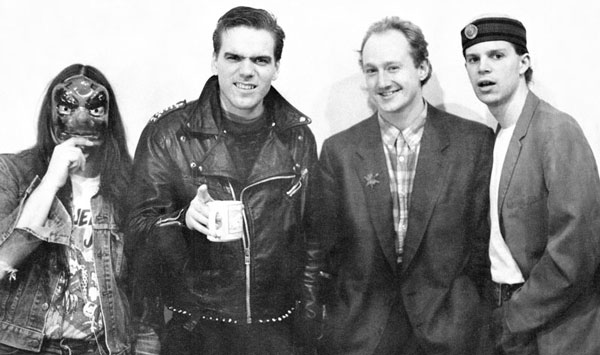JERRY JERRY
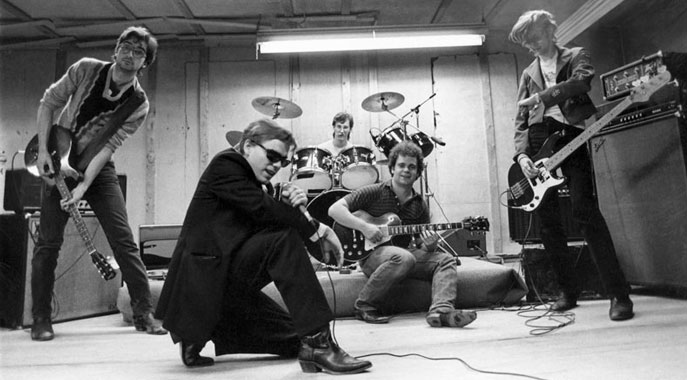
'80's Canadian punk with actual talent/songs
by Mike Chamberlain
(December 2021)
In the annals of Canadian punk rock history, the remote city of Edmonton, Alberta, contributed more than its share to the story. SNFU, Moe Berg, kd lang, Junior Gone Wild, and Jerry Jerry and the Sons of Rhythm Orchestra all emerged from the city between 1984 and 1986.
SNFU became punk rock legends, while kd lang achieved pop superstardom, and Moe Berg has had success with Pursuit of Happiness and as a producer since the mid-'80's. But the hardest-rocking band of them all was Jerry Jerry and the Sons of Rhythm Orchestra, who, despite great songs, a crack band, and a charismatic front man in Jerry Woods, did not achieve the level of success--or at least notoriety--that many think they deserved.
After releasing one album, Road Gore: The Band That Drank Too Much (1985, OG Music), Jerry Jerry and the SORO gained a reputation outside of Western Canada. In 1986 the band moved to Montreal, where they recorded one brilliant album, Battle Hymn of the Apartment, and then more or less imploded through bad luck and bad habits. Jerry Woods persevered through the 1990s, playing live shows in Eastern Canada and the U.S. and releasing two more albums, Don't Mind If I Do (1992) and The Sound and the Jerry (1997).
Edmonton, Alberta, has long, cold winters, and hockey culture rules. In the early 1980's, Wayne Gretzky and the Edmonton Oilers were winning Stanley Cups. But kids who weren't into sports didn't have many outlets. There were instruments around, though, so kids would get together and jam. And that's where Jerry Jerry and the Sons of Rhythm Orchestra started.
As Woods explains it, "We had what we called fuck bands. You'd just put together bands, and it didn't really matter."
Like the Sex Pickles. "Their schtick was they formed, they played three shows in three days, and they fired their bass player after every show, and then they broke up. You know, that kind of thing, and that's kind of what Jerry Jerry was to begin with," Woods continued.
"I was a big fan of the old gospel music. It started with me and Roland and Paul [Soulodre]. Roland in the beginning was the drummer, and he was quite a character. Later on, he switched to guitar and became arguably one of the best guitar players we ever had, if not the best. So we had the interest in roots music, and we thought we'd do ourselves a kind of revival meeting sort of piss-up. And we had fun with it."
The site of the first Jerry Jerry gig was a room in a frat house dubbed the Turtle Ballroom. "That was in late '81," Woods says. "We had the punk rock choir. They didn't know the songs, but we had a whole punk rock choir, and we had a really good time, and we kept that up. We didn't even really take it too seriously for a year or two maybe, and then we started doing a lot of shows and started traveling."
That is when I first saw Jerry Jerry and the Sons of Rhythm Orchestra at the legendary Spartans Men's Club. It was early 1984. My partner in rock 'n' roll, Dave Maenz, was living in Edmonton at the time. We were bringing the band to Saskatoon a week later, and Dave invited us to spend the weekend and check out the band so that we could properly talk them up before their show the next week.
Spartans was a square building on a corner lot in northeast Edmonton. Local groups rented it to put on shows, usually with four or five bands on the bill. Edmonton had an eclectic scene, not just hardcore punks.
Jerry Jerry was third on the bill. About ten minutes after the second band finished, people in the audience started stamping their feet and chanting, "Jerry, Jerry, Jerry, Jerry."
When the audience was excited enough, the band, without Jerry, ascended the stage and tore into an instrumental, "Gospel Surfer."
By the time they finished, the crowd was in a frenzy, chanting for Jerry, who took the stage as the band leaned into the second song, a slim, young Elmer Gantry in a hot pink shirt and a jean jacket that said "The King" on the back, clutching a bottle of Jack Daniels in one hand and the mic and a cigarette in the other. A rock and roll band doing gospel tunes and singing about the evils of socialism? We didn't quite get the politics and the Jesus stuff, but the band kicked ass and Jerry Jerry was delivering rock and roll Truth.
Dave and I knew we had to meet this madman. When he came off the stage, we greeted him almost as soon as his feet hit the floor. Within a few seconds he'd name checked Hank Williams, Sam Cooke, and the Cramps, declared that as far as he was concerned, Ronald Reagan was a socialist, and introduced us to his sweet, blonde girlfriend, whose sunniness contrasted with Jerry's rocker intensity. In fact, we'd made friends for life.
The next weekend, the band came to Saskatoon for their first-ever out-of-town gig, opening for Moe Berg's Modern Minds. Nine o'clock came, and the Jerrys had still not arrived. At about 9:10, three of the band members walked in the door. The rest of the band, they said, had stopped to have a fist fight at the side of the road.
About fifteen minutes later, the roadside pugilists arrived, and the band did a hasty sound check before their set, which rocked the house.
"I remember coming to town, and we realized that we did not know where we were playing, the name of the club, or anything, so we just looked for some cool-looking people on the street," Jerry remembers of the first JJ and the SORO road trip to Saskatoon.
"Luckily, I think the first people we asked where a cool show might be tonight told us. Because it was already sound-check time and we had no idea where we were going. But everyone survived somehow. I also remember, I think Phil Larson, Philo Lovejoy, was playing bass at that time, and the next day we got a call, and he said, 'I'm in a farmhouse, and I don't have any shoes, and there's no one here.' How do we find this guy?"
The first album, Road Gore: The Band That Drank Too Much, was aptly named, and the reasons why were all on display that weekend in Saskatoon.
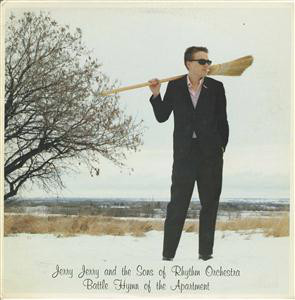
Battle Hymn of the Apartment (1987), Pipeline Records
After releasing Road Gore on Deja Voodoo's OG Music label, the band toured Eastern Canada in the late summer of 1985, with gigs in Ottawa, Montreal, and Toronto.
They were heckled in Ottawa for their song "Bad Idea," about the evils of socialism. The political sentiments went against the grain of those of the majority of the band's audience. Most people who went to the gigs took Jerry's political stance with a grain of salt, but the Sons of Rhythm did have the reputations as a red meat and guns band. But the episode was emblematic of the band's identity issues-not for them, but for the wider public.
Following the tour, the band returned to Edmonton, and then, in the summer of 1986, moved to Montreal. Both guitarist George Wall and bassist Jim Algie (aka Blake Cheetah) were moving to Montreal for university, and Jerry and guitarist Paul Soulodre (aka Ace Musical Vacations) had good jobs in Edmonton but were looking for something a little different, which Montreal's lively scene and proximity to other cities represented. "Follow the Cup, I remember George saying," says Woods, referring to the Montreal Canadiens 1986 Stanley Cup win.
Battle Hymn of the Apartment was recorded at Montreal's historic Studio Victor in the winter of 1986-87. Most of the album had been written by Woods, who wrote the lyrics, and George Wall, who did the music, at the low-rent Oslo Apartments in Edmonton. Algie remembers writing the band's signature tune "Runaway Lane" with Wall in a hotel room in Calgary. Woods, Algie, and Soulodre all have high praise for Wall's musical contributions, and the contrast between Road Gore and Battle Hymn lies mainly in the production values of the two albums. Steve Kravac is credited as producer, but Woods notes that Wall did the majority of the production work. Battle Hymn is a ballsy album with a big sound that hits the listener full in the face from first note to last. It contains two of Jerry Jerry's signature tunes, "Runaway Lane" and "The Drift," as well as "Bad Luck at Tulane," a tune about a basketball point-shaving scandal told from the point of view of the gambler, featuring the lines "Sunday morning, almost my favorite time of the week, Sunshine and coffee, but after all, what's last night to me?"
A year after moving to Montreal, though, three of the five band members had quit, and George Wall had decided that he would not tour. Worse, Billy Varvaris, the owner of Pipeline Records, had disappeared with Battle Hymn's master tapes, and after the initial pressing, there were no more copies of the record to sell. After three years of phone calls and staking out Varvaris's parent's home, Woods finally tracked down Varvaris, who happily handed over the master tapes, as if there had been no problem all along. Of course, by that time, all possible momentum from the album release had been lost. Woods notes that Battle Hymn appeared on college radio playlists twice, three years apart.
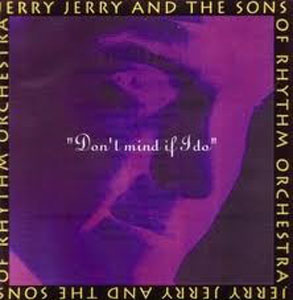
Don't Mind If I Do (1992), Aquarius Records
In the meantime, the personnel of the Sons of Rhythm Orchestra was in more or less constant flux. After Road Gore, guitarist Rockin' Roland and drummer Ed Dobek stayed behind in Edmonton, and after Battle Hymn, Soulodre, Algie, and drummer Duke Bronfman left the group, and Jerry needed to find new musicians. The band's next album, Don't Mind If I Do, came out in 1992, with Arch Jones on guitar, Andy Jameson on bass, and Alex MacSween on drums, along with Woods and Wall. Woods recalls that he took a hands-off approach to the production, some might say overproduction, leaving it to Wall.
The songwriting and playing evolved with each album. Road Gore sounds thin but energetic. It sounds like an album by a band that wasn't sure if they were going to record a second album. Battle Hymn has a bigger sound, with subtle and overt production touches. Don't Mind If I Do retained the big sound of Battle Hymn, while casting Jerry as a crooner.
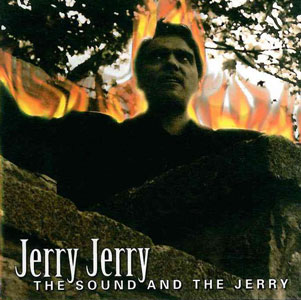
The Sound and the Jerry (1997), Aquarius Records
The mid-'90's was a period of drift. By the time Woods recorded the acoustic The Sound and the Jerry (1997), he had no band. The Sound and the Jerry reads as a farewell to minor rock stardom; by the end of the album, the jaded, egotistical character of the opening track, "I, Rockstar," is sleeping in a 1965 Ford Galaxy 500.
Only Woods, on guitar and vocals, and producer Tino Izzo, on guitar and percussion, played on the album. "At that time I told myself that it was an album about the descent of ego, but I don't think that was completely true either," Woods says about the album. "You start off egotistical and by the end you don't have an ego, but somehow the album always comes off as egotistical, so that didn't work out."
Woods moved back to Edmonton with his wife and five kids in 1999. Jerry, the once staunch antisocialist, is now a dedicated union man, having realized that unfettered capitalism is not the answer to society's problems. Woods continued to do Jerry Jerry and the Sons of Rhythm Orchestra gigs for a number of years. Woods and Soulodre returned to Montreal in 2017 to discuss a possible Sons of Rhythm Orchestra reunion with George Wall, Alex MacSween, and Andy Jameson. For various reasons, the reunion never came about, and with Wall's death from a pulmonary embolism in November 2020, the band has effectively come to an end. At the age of 60, Woods would rather spend his vacation at his mother's place on the Spanish Mediterranean coast than in a van touring with a bunch of middle-aged rockers.
A combination of bad habits and horrible luck kept Jerry Jerry and the Sons of Rhythm Orchestra from achieving the success that their music and stage show--which was always great (even when sloppy) rock and roll--deserved. One issue was that the band's music, a mix of elements from gospel, country, rock and roll, surf music, and punk, was not easily classifiable for radio programmers and concert promoters. There was the problem of the missing master tapes for Battle Hymn, and the fact that George Wall did not want to tour. And one must always take alcohol into account when the Jerry Jerry story is told.
Woods cites the infamous Edmonton Ski Club gig in May 1984, when the seven members of the band drank six cases of beer during sound check and then two bottles of Jack Daniels and two packs of cigarettes during their 45-minute set. "Just ridiculous overconsumption. And I'm not sure why, even. Reid Diamond, the bass player from Shadowy Men on a Shadowy Planet, said in an interview that Jerry Jerry wasn't a band, it was a drinking club."
But Jerry Jerry was more than that, I argue, for the talent and the songs and the recordings and the live show. And it's a shame that the band didn't become more popular than they did.
"Should we have been more famous? Arguably," Woods avers. "But I don't spend any time thinking about that. We definitely had some issues, some of it related to the glorification of ignorance and the overconsumption of alcohol. Maybe just some basic things could have helped out a bit. We almost had a manager once, but unfortunately he was struck by a car and killed, the manager of Grim Skunk. He was going to manage us, and then he was gone. It probably wouldn't have hurt to have a little bit more professionalism straight-up period."
"I like what we did. We had a few things going for us. Real strong drives in music from people like Roland and Ed and Paul, really dynamic musicians, and really good personalities like Cheetah, and a strong urge to perform. As Paul used to say, we just wanted to be able to know that we could blow anybody off the stage at any time. That might have been true for a while, and that in itself was very exciting."
